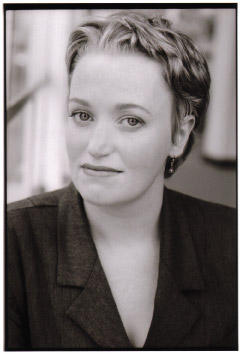Monday, November 28, 2005
Improv Nightmares
Following Braidwood's comment on the last post, I thought I'd make an attempt to explain why improv gives me nightmares!
The main attraction to improv for gifted people is usually the initial brain-candy aspect of it. Some favourite improv games reward the ability to memorize large amounts of irrelevant data and think fast. It's nice to find something where a quick brain is an asset, gaining admiring glances from your fellow players and laughs from an audience. But soon, I found that the only way to improve was to actually let go of thinking completely. To create improv, and any art, I needed to find a way to relinquish control.
This is because in order to perform great improv one needs to let down all defences and be totally in the moment. It has a meditative, trance-like quality to it; many improvisors finish a show with no memory of what just happened. It is even more powerful than meditation, because it includes movement and narrative, bringing in the wisdom of the body and the most primitive emotional parts of the brain.
When I am developing scenes on the spot, creating instant stories with one or more people, I am very vulnerable. We are tuning in to our collective unconcious, the very essence of our humanity, and working out our stories using the shadow part of our personalities. Naturally this brings up stuff that we would rather keep hidden, as we work out our personal dramas on each other through the characters and scenes we create. It's a turbo-charged version of our individual dreams, with the added twist of having other characters and viewpoints made real within the scene. I think that's why improv is so fascinating to watch, and also why vivid dreams are a common after-effect for the players.
Keith Johnstone was very aware of all this when I worked with him. He concentrated on reducing fear in his students as well as building performance skills. Keith emphasized continually that we were safe and showed us how to create that safety in a workshop group. His personal grace was an anchor we could all cling to as we unlocked our minds. Keith is an amazing teacher, of improv, but also of the process of teaching. Take his classes whenever you can, even if you have no interest at all in improv!
Technorati tags: gifted improv art
The main attraction to improv for gifted people is usually the initial brain-candy aspect of it. Some favourite improv games reward the ability to memorize large amounts of irrelevant data and think fast. It's nice to find something where a quick brain is an asset, gaining admiring glances from your fellow players and laughs from an audience. But soon, I found that the only way to improve was to actually let go of thinking completely. To create improv, and any art, I needed to find a way to relinquish control.
This is because in order to perform great improv one needs to let down all defences and be totally in the moment. It has a meditative, trance-like quality to it; many improvisors finish a show with no memory of what just happened. It is even more powerful than meditation, because it includes movement and narrative, bringing in the wisdom of the body and the most primitive emotional parts of the brain.
When I am developing scenes on the spot, creating instant stories with one or more people, I am very vulnerable. We are tuning in to our collective unconcious, the very essence of our humanity, and working out our stories using the shadow part of our personalities. Naturally this brings up stuff that we would rather keep hidden, as we work out our personal dramas on each other through the characters and scenes we create. It's a turbo-charged version of our individual dreams, with the added twist of having other characters and viewpoints made real within the scene. I think that's why improv is so fascinating to watch, and also why vivid dreams are a common after-effect for the players.
Keith Johnstone was very aware of all this when I worked with him. He concentrated on reducing fear in his students as well as building performance skills. Keith emphasized continually that we were safe and showed us how to create that safety in a workshop group. His personal grace was an anchor we could all cling to as we unlocked our minds. Keith is an amazing teacher, of improv, but also of the process of teaching. Take his classes whenever you can, even if you have no interest at all in improv!
Technorati tags: gifted improv art
Comments:
<< Home
Jo Jo,
I'm sure you will not be surprised as I insist that improv is in fact not more powerful than meditation, precisely because it includes movement and narrative.
Post a Comment
I'm sure you will not be surprised as I insist that improv is in fact not more powerful than meditation, precisely because it includes movement and narrative.
<< Home


